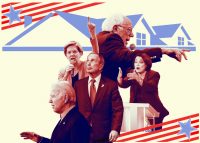Advocates have long sought solutions to housing affordability, but recent social unrest has prompted a closer examination of the injustices baked into the system.
Barika Williams, for one, is “cautiously hopeful” that momentum is building to address structural inequality in housing.
“At the fundamental base, housing is rooted in racism,” said Williams, the executive director of the Association of Neighborhood and Housing Development, during a TRD Talks panel this week. “Our entire property system is rooted in keeping some people out and allowing other people access.”
Her organization advocates for low- and moderate-income housing on behalf of its membership of New York City nonprofit affordable housing groups such as Chhaya Community Development Corporation, Riseboro Community Partnership and the Urban Homesteading Assistance Board.
Williams was joined by Adam Weinstein, CEO of Phipps Houses, the city’s largest nonprofit affordable housing developer. Weinstein suggested keeping Housing Court closed during the pandemic, which tenant advocates and lawmakers have been pushing.
“[Housing Court] is a ludicrous exercise, and if I were a tenant lawyer I would say the very same thing,” Weinstein said. “In this crisis, any landlord who tries to evict someone is insane, but for an affordable provider it’s particularly idiotic because there’s no one to occupy the unit.”
The court’s haphazard reopening last week confounded landlord lawyers because of the confusing guidance on what cases can and cannot be filed. The reopening also alarmed tenant advocates, who warned of an impending eviction wave.
Read more



But to address structural inequality and racial disparities in housing, urban planners must envision communities differently, said Williams, who is an urban planner.
“A lot of what we’re taught is a very white, wealthy, straight heterosexual idea of what neighborhoods are supposed to look like,” she said. “We really have to recognize and understand that if we are saying we value diverse neighborhoods, we have to plan to include that diversity.”
But despite an outcry from housing developers, advocates and even former city housing czar Alicia Glen, money for affordable housing is on the chopping block. A multi-billion dollar budget shortfall led Mayor Bill de Blasio to propose significant cuts to the affordable housing budget, which would delay the financing of some 21,000 units.
Developing housing for the lowest-income New Yorkers that generates enough of a return to keep private investors interested continues to be a challenge for affordable housing developers.